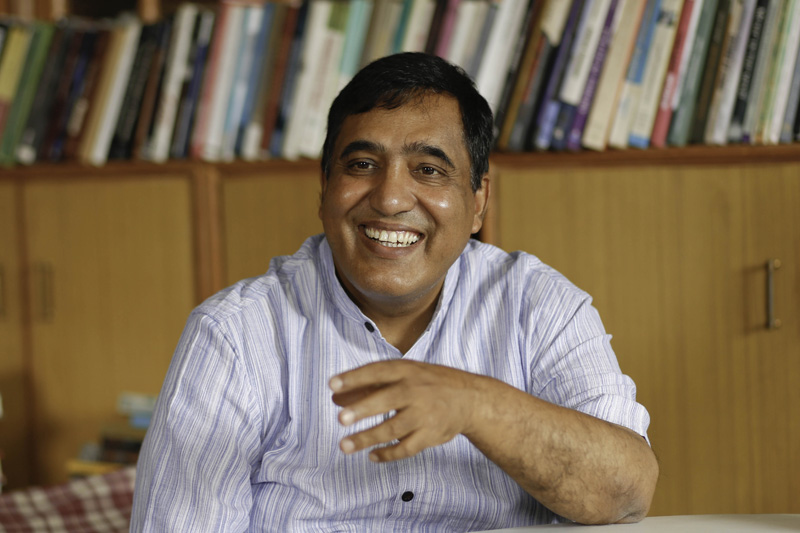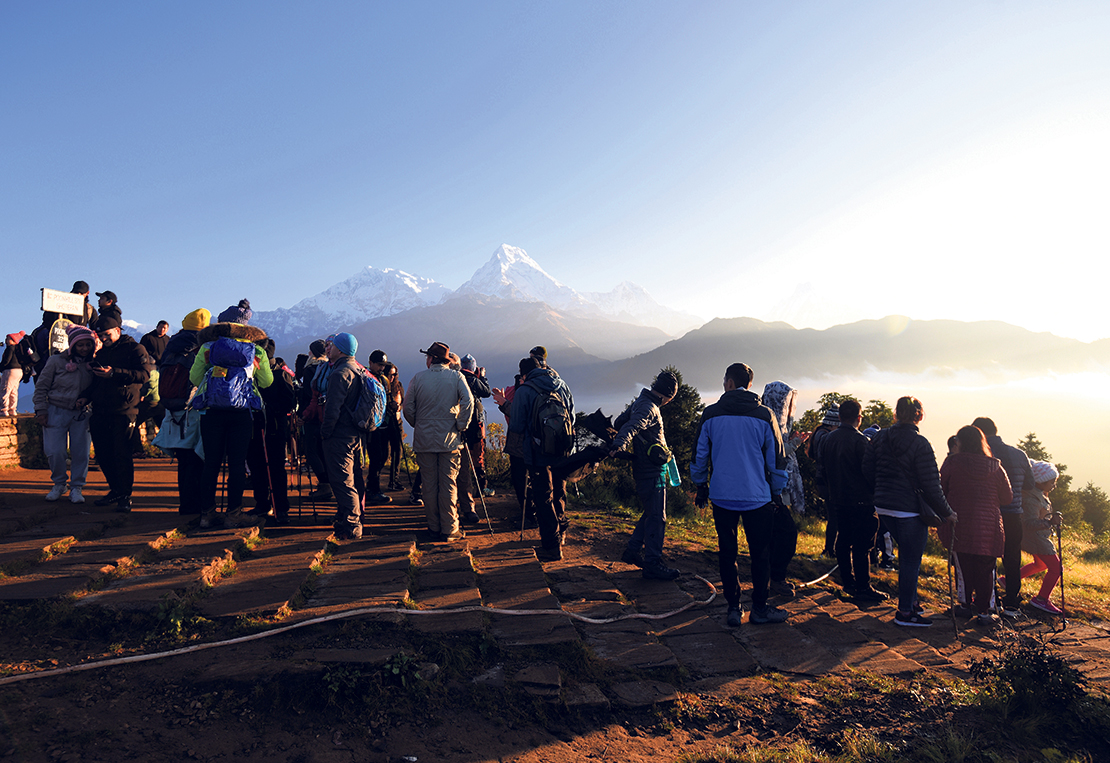
OR
Thursday Talk
The new forces don’t have clear stands on core political issues
Published On: May 11, 2017 05:30 AM NPT By: Republica | @RepublicaNepal

Hari Sharma has closely observed Nepali politics from both in and out of government and is widely known for his erudite, independent analysis. So what does he make of the upcoming local election? Will the election help solve the larger political and constitutional issues? How will the new political actors fare? And what can Nepalis look forward to? The veteran political analyst sat down for a chat with Republica’s Biswas Baral and Mahabir Paudyal at his home in Kapan, Kathmandu on Wednesday morning.
How do you see the upcoming local elections? How important is it for Nepal right now?
These are somewhat weird and at the same time interesting times. People are voting for their local representatives nearly after two decades. It is indeed a historic time for all of us. We unfortunately had to have two elections for Constituent Assembly, after the first assembly failed to deliver. These local elections are particularly important because it is being held in the wake of emergence of “new politics” in Nepal.
Could you elaborate on this new politics that you refer to?
In the past ten years or so, we have been hearing that the main challenge of Nepali politics is to ensure proportional representation in political process based on identities. This is the age of identity politics in Nepal. The kind of political deadlock we saw over the past decade was about representational politics based on identities. Particular identities are used in particular times to articulate particular kinds of politics. That means we all have multiple identities. But we foreground particular identity. For example, the recent imagination of Nepali politics is identity based on ethnicity, caste, gender and so on. As a student of political science and democracy, I am curious about how that unfolds in local elections. For me, local elections are important in terms of furthering the kind of politics we have been demanding and articulating for the past 20 years. This is about resolution of issues that we raised. In other words, the political parties and our experts in politics are saying that local election is a way of fulfilling constitutional requirements and about implementing the constitution. But I look beyond constitutional politics. How will local elections help resolve political questions that we have been imagining or articulating? So to me this election is an important instrument to institutionalize representative democracy at one level, and at the same time an opportunity to resolve political questions we have raised.
But aren’t local elections about specific local issues rather than these broader themes you talk about?
Politics is mainly local. By local, I mean what concerns me the most in my surrounding. We are all concerned with what happens around us. Campaigners of local elections talk about infrastructure and development in Kathmandu. It may be the same in villages as well. People are rarely talking about delivery of services of other kind. They rarely talk about the delivery of government policies. And there is little resonance of how identity will play out in these campaigns. So it seems this election is continuation of old politics because the candidates are still not ready to talk about the power bestowed on them by the constitution. The new local bodies are governments in themselves, not agencies of the state to deliver development and services. They are autonomous bodies. But the candidates do not seem to take it that way. Many of us seem to understand local governments simply as agencies of the state to deliver “traditional” development and infrastructure. The major issue, however, is how local election will shift traditional understanding of politics. Yet I see the great prospect. With elected bodies all over the country it would be difficult for anti-democratic reversal. So this election is an exercise in the march of forward-looking politics. But it remains to be seen if it will help solve the larger political questions.
Why do you see the local bodies as embodiments of old politics when they have been given vastly more powers to function autonomously?
That is the intent of the constitution. But those noble intentions can be materialized only if we internalize them. The elected representatives may internalize those changes after they start working.
Or they may learn by doing. But what I have seen in the run up to the election is that people are not talking about the huge shift the constitution has envisioned in local government. Maybe this is because there was uncertainty over election until recently. Political parties were rushed into it. The election is being held in two phases and we are still not sure whether the second phase polls will be held successfully. The sad part is that political parties themselves have not educated their cadres on new constitutional responsibilities of local governments. For many, it’s business as usual. The candidates vying for this election seem to think resources will come from the center and they do not need to manage it themselves. Once local governments are elected, there will be intense competition among them to raise money. This calls for innovative thinking and new ways of looking at politics. I don’t see this happening. Great changes are institutionalized if we are able to internalize those changes and work accordingly. I don’t see this happening. If something fails tomorrow it won’t be because the institutions we created did not work but because we did not make them work. The onus lies on our representatives and political party leaders to make them work.
Can we say political parties have not internalized the change as they are comfortable with status quo?
By our very nature, all of us are status quoist. Taking a new course is always difficult. As for the political parties, there is rage against political class all over the world. Populist movements have gained currency all over the world. There is a kind of disjuncture between the way political parties work and the way people expect them to work. Political parties have become more arrogant because we cannot imagine democracy without political parties. We need them to run the representative democratic system.
One of the major propelling engines of democracy is availability of choice. In our case, we have limited choices and political parties know this. This has made them arrogant. Their recent decision on impeachment of Chief Justice is a case in point. They feel they can get away with anything. So there is a need both to rethink democracy and the role of political parties in a democracy. Political parties also need to understand they cannot have it their way all the time. They need to take into account popular changes and people’s changing aspirations.
We seem to be locked in a strange dilemma. We want to rule ourselves. Ruling ourselves in a modern liberal democratic system requires political agencies, the political parties. But those parties do not work as per our expectations. In this dilemma we are left with limited choices. Therefore, if we critique these political parties and democracy too much, that could create space for authoritarian forces. There is a great liberal’s dilemma here. You don’t like the political leaders and parties but you cannot say you don’t like them. If this condition exists for long it will in the long run breed indifference and apathy, which in turn will lead to anger against the political parties. Some new forces have emerged but they are yet to become credible institutions.
You talked about new political forces. How do you see the emergence of new parties like Sajha Party and Bibeksheel Party?
Our new political forces seem to be based not on social movement or ideology but on certain dissatisfaction, urban dissatisfaction to be more precise. Can you build politics around dissatisfaction? When I look into their statements I feel like they are based on some sort of technocratic romanticization.
We are having local election amidst great political uncertainties. The constitution that was amended right away after its promulgation is being put up for amendment second and third times. One argument for amendment is that it needs to be made more inclusive to accommodate regional identities and aspirations and to address demands for meaningful federalism. We cannot say what will be the fate of these demands after the first phase of local elections.
Second phase must happen because you cannot deny right to vote to the rest of the country. But any possible amendment might create new tensions. Yet I see hope in all this because we have invented politics to manage conflict. If we believe in the possibility of politics, we must also believe things will move in the right direction.
So in your view the emergence of these new political forces is not something to celebrate?
The longevity of democracy hinges on the number of choices people have. The more the choices, the better the democracy. You cannot imagine democracy without choices. In this respect, I welcome the emergence of new forces like Bibeksheel and Sajha Party. But there is little critique on why old parties failed and why they had to come. They have emerged by pointing out inadequacies of old parties. They have raised questions of corruption and say old parties have no innovative ideas. But what are their political imaginations? They seem to stand on ‘non-political political’ foundation. How do the new forces differ from the larger political parties? They seem more technocratic. They don’t have concrete positions on core political issues. For example, what is the position of Sajha Party or Bibeksheel Nepali on constitution amendment and federalism? If they have aspiration of becoming national parties they need more clarity on these constitutional preoccupations that have been haunting us. And this applies to influential leaders of old parties as well.
For example, one of the major politicians of Nepali Congress, who is in the cabinet and is doing rather well, has no position whatsoever on these critical issues. If the political parties want to ensure their longevity and relevance they need to take political positions. What is their position vis-à-vis Madhesh? Nepal has completely transformed in terms of its political imagination. Who is Nepali is a contested notion. Nobody is talking about this. All of us have turned into consumers of their imagination. This is what I meant by the liberal’s dilemma. I can critique what is happening here but I am constrained by the availability of choices. I was expecting new political innovations in terms of contesting and challenging these political questions from the new parties. These new parties are good at critiquing the current situation but they are not offering alternative imaginations. I have seen their discourse on corruption. Corruption is a catchy issue and people can rally around it. But corruption is not a long term social movement agenda. The long term agenda could have been transparency in public office. You need to have institutional understanding of how politics works and you need institutional arrangement to root out corruption.
Would you agree with the assessment that given the deep social roots of established parties the new players in the field have little chance of doing well?
Democracy thrives only when there are multiple choices. We cannot imagine representative democracy without political parties. Mainstream parties have penetrated deep in the society over the years through the distribution of patronage. Unlike other countries where political parties are representative political institutions, in Nepal these parties were considered transformational forces, rather than just representative forces. Democracy in Nepal is a gift of these parties. But they have nearly become feudal now. If democracy is institutionalized through regular elections and contestation, there is a possibility of emergence of new alternatives. Traditional political parties have created abnormality by always telling us that democracy is in danger.
We need to implement this constitution through elections and by creating local institutions. At the same time, we need to address the abnormality of constitution amendment as well. Political parties are always creating the situation of abnormality to cover their misdeeds. It’s a very strange situation. I expect new forces to challenge them to bring politics back to a state of normalcy.
Do you see the possibility of new forces consolidating considerable strength through elections in the next few years?
I don’t see that possibility at the moment. Political education takes time. I don’t see the possibility of these new parties getting pan-Nepal importance because their organizations are limited to certain urban areas. They need to work at organization building more vigorously and reach every nook and corner of the country. They have to be visible to impact political course through creation of alternative discourse. It’s good that they have been tested at certain local areas where they have emerged.
Maybe they can make a bigger dent on provincial or federal election. Given our electoral system, they can emerge as national actors if they can inspire a new kind of politics that can act as a bridge between identity politics and territorial local politics. Like I said, if the new political forces want to make impact at national level they need to have certain positions on important national issues. But they have not spoken about republican politics. I have not heard them talk about federalism, secularism, or about the kind of economic system or foreign policy we need. These traditional categories shape Nepali politics at the moment. Our future constitutional contentions will be based on how we tackle these questions. The context is local election but in order to graduate to national level, the new forces need to have clear positions on these perennial preoccupations of Nepali politics.
When I say this, let me also add that I see traditional political parties behaving more like corporatist forces than representative parties. They did a great disservice to new forces by not allowing them to have their own unique election symbols. This has created confusion among voters. They get election symbols a week before the Election Day. How do you go around in this situation? We don’t have a system of voting by name.
You May Like This

EU’s Tusk to Trump: Respect your allies, you don’t have many
BRUSSELS, July 10: European Council President Donald Tusk called on Donald Trump to be more respectful towards America’s allies ahead... Read More...

Have been lucky to have equal pay: Emma Stone
Emma Stone, who has generated Oscar buzz with her role of a struggling actress in La La Land, says she... Read More...




Just In
- UML's National Convention Representatives Council meeting today
- Gandaki Province CM assigns ministerial portfolios to Hari Bahadur Chuman and Deepak Manange
- 352 climbers obtain permits to ascend Mount Everest this season
- 16 candidates shortlisted for CEO position at Nepal Tourism Board
- WB to take financial management lead for proposed Upper Arun Project
- Power supply to be affected in parts of Kathmandu Valley today as NEA expedites repair works
- Godepani welcomes over 31,000 foreign tourists in a year
- Private sector leads hydropower generation over government






_20220508065243.jpg)








Leave A Comment